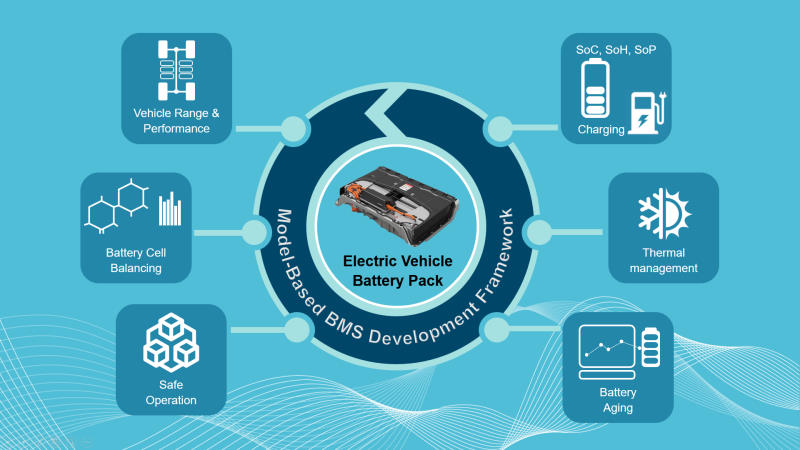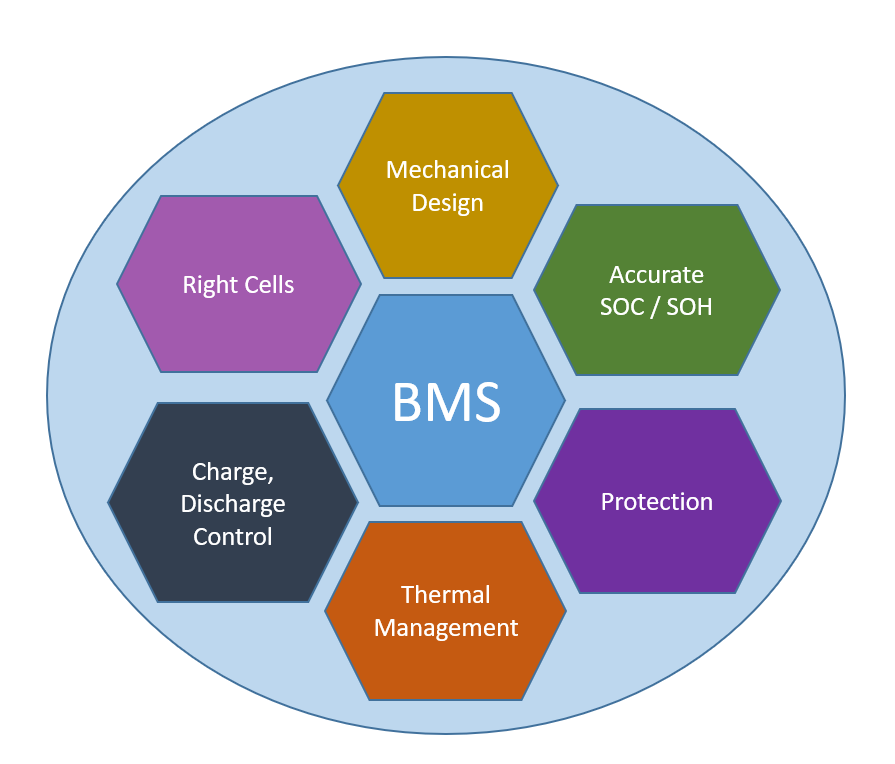Introduction to BMS (Battery Management System)

The Battery Management System, commonly referred to as BMS, is a pivotal component in the realm of modern energy solutions. At its core, a BMS is a sophisticated system designed to oversee and regulate the operations of batteries. These operations encompass a wide range of tasks, from monitoring the state of charge and voltage of individual cells to tracking the overall temperature of the battery pack.
But why is such a system so crucial? Firstly, batteries, especially those used in high-demand applications like electric vehicles or renewable energy storage, are complex entities. They require precise management to ensure they function at their peak efficiency. A BMS ensures that batteries are neither overcharged nor over-discharged, both of which can significantly reduce a battery’s lifespan.
Moreover, safety is a paramount concern when dealing with batteries. A malfunction or misuse can lead to hazards such as fires or explosions. Here, the BMS steps in as a guardian, continuously monitoring for any anomalies and taking corrective actions when necessary.
In essence, the Battery Management System is not just about optimizing performance; it’s about ensuring that batteries, which are the backbone of many modern technologies, operate safely and efficiently, thereby guaranteeing their longevity and reliability.
Battery Management System (BMS): A Deep Dive into Its Key Functions

In the realm of battery technology, the Battery Management System (BMS) stands as a cornerstone, ensuring the optimal operation, safety, and longevity of battery packs. As a designer of BMS, I can attest to the intricate complexities and the paramount importance of this system in modern energy solutions. Let’s delve deeper into the key functions of a BMS:
Monitoring
At its core, a BMS serves as the vigilant eye overseeing the battery’s operations. It continuously tracks the battery’s state of charge (SoC) to determine how much energy remains. By monitoring the voltage of individual cells, this system ensures that they operate within their specified limits, preventing any cell from underperforming or being overburdened. Additionally, temperature monitoring is crucial. Batteries, especially lithium-ion ones, are sensitive to temperature variations. Operating a battery outside its temperature comfort zone can degrade its performance and even pose safety risks. The BMS, with its temperature sensors, ensures that the battery operates within a safe temperature range, triggering cooling systems or heaters as needed.
Balancing:
Batteries are composed of multiple cells, and for optimal performance, it’s imperative that these cells are balanced, meaning they have similar charge levels. Over time, slight differences in the cells can lead to some cells having more charge than others. The BMS steps in with its cell balancing function, ensuring an even charge and discharge across all cells. This not only maximizes the battery’s capacity but also extends its lifespan by preventing undue stress on any single cell.
Protection:
The BMS is the guardian of the battery, ensuring its safety at all times. Batteries can be damaged or even become hazardous if they’re overcharged or discharged beyond their limits. The BMS continuously checks for these conditions and takes corrective actions, such as disconnecting the battery or alerting the user. Overheating is another concern. Excessive temperatures can degrade the battery’s materials or, in extreme cases, cause fires. The BMS’s protective measures ensure that the battery operates within safe temperature boundaries, activating cooling systems or shutting down the battery if necessary.
Reporting
Knowledge is power, and the BMS provides invaluable data about the battery’s health and performance. Through its reporting function, users can access real-time information about the battery’s state of charge, voltage levels, temperature, and more. This data is crucial for maintenance, troubleshooting, and ensuring the battery’s optimal performance over its lifespan.
Applications of BMS

In the realm of energy solutions, the Battery Management System (BMS) stands as a sentinel, ensuring that batteries operate efficiently, safely, and with longevity. As a designer of BMS, I’ve had the privilege to delve deep into its intricacies and witness firsthand its transformative impact on various applications. Let’s explore some of these applications and understand the pivotal role of BMS in each.
Electric Vehicles (EVs): The Need for Precision and Safety
Electric Vehicles have revolutionized the transportation industry with their eco-friendly and efficient nature. However, charging these vehicles isn’t as simple as plugging in a charger. EVs require higher voltage and amperage for charging, which, if not managed correctly, can lead to inefficiencies or even safety hazards. This is where the BMS comes into play. It meticulously monitors and manages the charging process, ensuring that the battery receives the right amount of voltage and current. By doing so, the BMS not only enhances battery efficiency but also ensures the safety of the vehicle and its occupants. In essence, while the battery is the heart of an EV, the BMS is its guardian, ensuring that the heart beats steadily and safely.
Renewable Energy Systems: Harnessing and Distributing Nature’s Power
Renewable energy, particularly solar energy harnessed through photovoltaic panels, is the future of sustainable power. These panels absorb sunlight and convert it into electricity. However, the energy generated isn’t always immediately used. It often needs to be stored for later use, especially during non-sunny hours. This is where BMS becomes crucial. The stored energy in batteries, if not managed properly, can lead to inefficiencies or even wastage. The BMS ensures that the energy from photovoltaic panels is stored optimally and is distributed efficiently when needed. In simple terms, while the photovoltaic panels are the collectors of nature’s power, the BMS ensures that this power is delivered seamlessly to our homes and devices.
Consumer Electronics: Enhancing Everyday Experiences
Take a moment to think about your iPhone. It’s not just a device; it’s an extension of yourself. But what happens when it runs out of battery? Thanks to the BMS, instead of abruptly shutting down, it enters a ‘battery saving mode’, optimizing the remaining energy to last longer. This is the magic of BMS in consumer electronics. It ensures that devices like smartphones operate efficiently, extending their battery life and enhancing user experience. The BMS constantly monitors the battery’s health, making real-time decisions to optimize performance. So, the next time your iPhone lasts that extra hour when you desperately need it, remember to thank the unsung hero – the BMS.
In conclusion, the Battery Management System, though often overlooked, is the backbone of modern energy solutions. Whether it’s driving an EV, powering a home with solar energy, or simply making a call on a smartphone, the BMS is always working behind the scenes, ensuring efficiency, safety, and optimal performance. As a designer, I can confidently say that the future of energy is bright, and BMS will be at its forefront, guiding us towards a sustainable and efficient tomorrow.
Benefits of Using a BMS

The integration of a Battery Management System (BMS) into energy storage solutions offers a plethora of advantages. As the world leans more towards sustainable energy, understanding these benefits becomes essential for businesses, professionals, and consumers alike. Let’s delve into the primary advantages of employing a BMS:
- Extended Battery Life: One of the most significant advantages of a BMS is its ability to extend the lifespan of batteries. By continuously monitoring and adjusting the battery’s operations, a BMS can prevent premature battery degradation. This means batteries can function effectively for a more extended period, reducing the frequency of replacements.
- Enhanced Safety: Batteries, especially those used in high-capacity applications, can pose safety risks if not managed correctly. Overcharging, overheating, or short circuits can lead to fires or explosions. A BMS continuously monitors for these potential hazards and takes immediate corrective actions, significantly reducing the risks associated with battery malfunctions.
- Improved Efficiency: A BMS ensures that the battery operates at its optimal performance level. By balancing individual cells and ensuring they are charged and discharged uniformly, the system maximizes the battery’s output and efficiency. This means devices and systems powered by these batteries can operate longer and more effectively.
- Cost Savings: While the initial investment in a BMS might seem like an added expense, the long-term cost savings are substantial. By extending battery life and reducing the need for frequent replacements and maintenance, businesses and consumers can save significantly in the long run. Additionally, by preventing potential battery malfunctions, a BMS can also save costs associated with damage to equipment or property.
Conclusion:
The Battery Management System (BMS) serves as a testament to the advancements in energy storage and management technologies. As we’ve explored, its role in ensuring the safety, efficiency, and longevity of batteries is undeniable. Whether it’s in our everyday electronic devices, electric vehicles, or large-scale renewable energy storage systems, the BMS silently works in the background, optimizing and safeguarding our energy solutions.
Now if you still have other questions or need about this topic, please feel free to contact ye@voltageace.com. We will provide you with the best offer.

